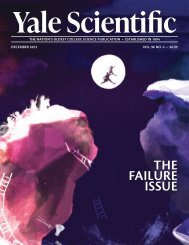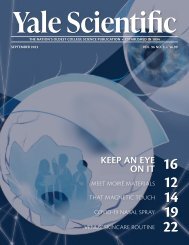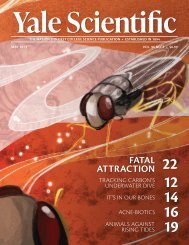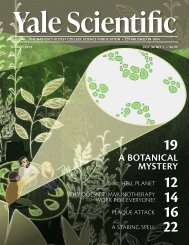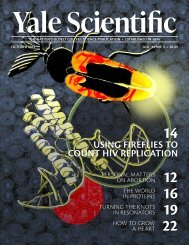YSM Issue 86.4
You also want an ePaper? Increase the reach of your titles
YUMPU automatically turns print PDFs into web optimized ePapers that Google loves.
ALUMNI PROFILE
FEATURE
At Home in the Wilderness: Yenyen Chan SY ’94, F&ES ’01
Yenyen Chan fell in love with Yosemite National Park
while exploring its wilderness and vistas during a high
school field trip. Now, after graduating from Yale College
and the Yale School of Forestry and Environmental
Studies, she has returned to the place where it all began:
As a United States Park Ranger in Yosemite, Chan works
to pass her knowledge and enthusiasm about the natural
world on to the next generation of park visitors.
Before coming to Yale, Chan was already interested
in environmental studies. Her courses in environmental
history and policy only solidified this focus. “Professor
John Wargo, who later became my advisor at the Forestry
School, really opened my eyes to the environmental policy
issues facing the country,” reflected Chan.
After a summer internship with the Natural Resources
Defense Council, Chan spent a few years at an
environmental consulting firm in Hong Kong. By working
in a region undergoing rapid development, she gained a
more global view of topics such as waste, water and air
pollution, and corporate environmental stewardship.
Looking back on her time at the Forestry School, Chan’s
recollections mirror the giddy faces of most students in
Kroon Hall today. “I loved it,” she said. “All of us in
this field want to do this work because it’s something
we love and because it’s critically important, both
socially and environmentally.” After gaining a Masters in
Environmental Policy and Resources Management, Chan
landed a position with the Yosemite Institute as a field
science instructor, and became a park ranger a year later.
Now, even after ten years of working in Yosemite,
Chan’s life as a park ranger is never dull. “There is no typical day,” she
said with a laugh. Her activities range from leading visitors on full-day
hikes to giving star and campfire programs at night, and she spends
much of her time teaching visitors about the rich history of Yosemite.
While Chan works much of the year in Yosemite Valley, she spends
the summer months in her favorite part of the park, Tuolumne
Meadows. Open to visitors from June to October, the meadows are
nestled in the Sierra Nevada mountain range at 8600 feet above sea
level, and characterized by breathtaking sub-alpine meadows and
peaks. To nature-enthusiasts like Chan, the beauty makes up for the
accommodations. “I live in a rustic tent cabin,” she explained. “Cold
running water, electricity, and a tarp roof over my head — it’s pretty
primitive.”
In addition to working in the field, Chan conducts educational
programs pertaining to subjects such as geology, history, resource
conservation, and climate change. For instance, in 2011 she created
a project that chronicles the history of Chinese laborers in Yosemite.
“There wasn’t much research about the topic,” Chan explained, when
she was asked to teach visitors about early Chinese contributions to
the park. Eventually, she co-produced a short park video on the topic.
Chan is also one of several park rangers participating in a multi-year
collaborative project between NASA, the Fish and Wildlife Service,
and the National Park Service on communicating climate change
science to park visitors.
BY ZOE KITCHEL
IMAGE COURTESY OF YENYEN CHAN
As a field science instructor and park ranger, Chan leads long, full-day
hikes and educates visitors on the history of Yosemite National Park.
Chan, a strong advocate of environmental consciousness, believes
that one of the parks’ most important roles is to educate visitors.
“The environment is important for our health and the health of the
planet,” she said. Her mission as a park ranger is two-fold; she strives
not only to share the beauty of the park with visitors, but also to make
them aware of the various threats that endanger its survival—invasive
species, habitat changes, diminishing snowpack, and wildfires, to name
a few. “To experience nature is both inspiring and humbling, and it
helps people take into account how important it is to have places like
this,” said Chan.
Although her work is primarily as a naturalist and educator, Chan’s
interests also lie in of environmental policy, especially the intersection
between public and environmental health. “Working with a national
environmental organization such as the Natural Resources Defense
Counsel or the Environmental Defense Fund still potentially lies in
my future,” she said. But for now, she is content to share one of the
country’s most beautiful places with visitors from across the world.
According to Chan, “It’s wonderful to see them experience it all.”
The temporary closure of National Parks this October due to the
government shutdown reminded the country how, as Chan explained,
“We depend on Congress to fund these places.” However, government
support is supplemented and shaped by public support. The recent
celebration of Yosemite’s 123rd birthday brings another statement of
Chan’s to mind: as she put it, “It’s a park for everyone.”
www.yalescientific.org
November 2013 | Yale Scientific Magazine 35




